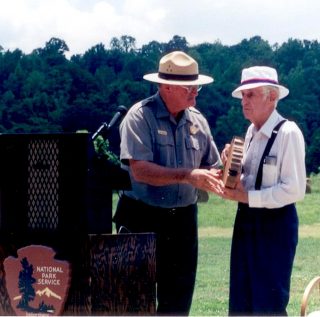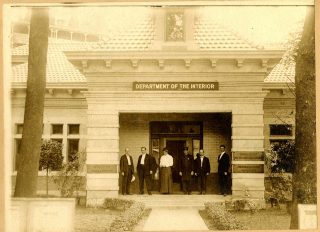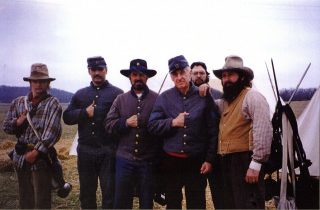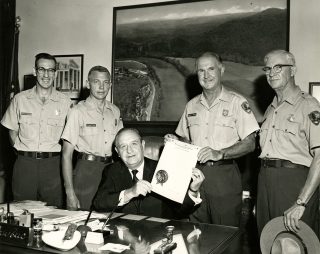[et_pb_section admin_label=”section”][et_pb_row admin_label=”row”][et_pb_column type=”4_4″][et_pb_text admin_label=”Text” background_layout=”light” text_orientation=”left” text_line_height=”1.4em” use_border_color=”off” border_color=”#ffffff” border_style=”solid” text_text_color=”#686868″]
Happy 100th Birthday, National Park Service!

August 25, 2016, the National Park Service turns 100 years old. The National Park Foundation has a website to help you find out more, and the National Park Service is inviting you to their birthday party with free admission from August 25-28 and many other events: https://www.nps.gov/subjects/centennial/birthday-invitation.htm.
The modern park system was created when President Woodrow Wilson signed the National Park Service Organic Act into law August 25, 1916. (The National Archives are currently exhibiting the original signed law.) Hot Springs is arguably the oldest location currently preserved as part of the National Park System. Congress established it, “America’s Spa,” as a national reserve exempt from settlement in 1832, more than 30 years before Yosemite Valley was set aside by the federal government and 40 years before Yellowstone was created as the first national park.
There are currently seven National Park Service sites in Arkansas, including two parks (Pea Ridge and Hot Springs), two National Historic sites (Fort Smith and Little Rock Central High School), the President Clinton Birthplace Home, the Arkansas Post National Memorial, and the nation’s first National River. In addition there are 25 National Historic Landmarks in Arkansas, including what remains of the Rohwer Japanese American Internment Center protected as the Rohwer Relocation Center Memorial Cemetery.


For the past year, the National Park Service has been celebrating with events around the country and social media campaigns such as encouraging visitors to use #FindYourPark for their social media updates.
In the University of Arkansas Libraries Special Collections, we can find our parks in several places, from the records of national parks like Hot Springs to family archives and professional papers that preserve stories of how Arkansans have enjoyed their parks and worked to establish them. The numerous collections of papers of Arkansas’s public officials such as Senator J. William Fulbright held by the University Libraries also provide a wealth of information on the work to federally protect important cultural and ecological sites in the state.

We’ve put together a selection of resources available in Special Collections including archival finding aids, digital projects, and research guides to help you learn more about the National Parks that help protect and share the history, culture, and natural beauty of Arkansas.
Hot Springs National Park
- U.S. National Park Service, Business Records of Hot Springs, Arkansas Bathhouses, 1903 to 1975 (Mc367). http://libinfo.uark.edu/specialcollections/findingaids/mc367.pdf.
- Fordyce Family Papers (MC1311): http://libinfo.uark.edu/SpecialCollections/findingaids/fordyceaid.html.
- Mary D. Hudgins Collection (MC534): http://libinfo.uark.edu/SpecialCollections/findingaids/hudgins/hudgins1aid.html.
Pea Ridge National Military Park
- Congressman Clyde Ellis Letters (MC326): https://libinfo.uark.edu/SpecialCollections/findingaids/ellisaid.html.
- Congressman James W. Trimble Family Papers (MC557): https://libinfo.uark.edu/specialcollections/findingaids/trimble.html.
- Berry Dickinson, Peel, Family Papers (MC1372): http://libinfo.uark.edu/specialcollections/findingaids/berrydickinsonpeel.html
Little Rock Central High School National Historic Site
- Resources for the 1957 Little Rock Integration Crisis: http://libinfo.uark.edu/specialcollections/research/guides/integration1957.asp.
Buffalo National River
- Neil Compton Papers (MC1091): http://libinfo.uark.edu/specialcollections/findingaids/compton.asp.
- US Senator Dale Bumpers Papers (MC1490): http://libinfo.uark.edu/SpecialCollections/findingaids/mc1490/default.asp.
- US Representative John Paul Hammerschmidt’s Papers (MC1230): http://libinfo.uark.edu/SpecialCollections/findingaids/mc1230/.
- Kenneth L. Smith Papers (MC1423): http://libinfo.uark.edu/specialcollections/findingaids/smithk.html.
- Ozark Society Records (MC477): http://libinfo.uark.edu/specialcollections/findingaids/ead/transform.asp?xml=mc477&xsl=findingaid.
- 40-50-100 Digital Project celebrating the founding of the Buffalo River: http://digitalcollections.uark.edu/cdm/landingpage/collection/arknatenv.
- Environmental History Resources Guide: http://libinfo.uark.edu/specialcollections/research/guides/environment.asp.
Fort Smith National Monument
- Fort Smith National Historic Site Records (MC 216): https://libinfo.uark.edu/specialcollections/findingaids/ftsmithnhs.asp.
- US District Court for Arkansas (Western District) Correspondence, 1872-1901 (MS W56).
- Isaac Charles Parker Correspondence and Employment Contract, 1885, 1888 (MS P229).
- Benjamin T. Duval Family Papers (MC1212): http://libinfo.uark.edu/specialcollections/findingaids/duvalaid.html.
Arkansas Post National Memorial
- Governor Orval E. Faubus (MS F27) Papers: http://libinfo.uark.edu/SpecialCollections/findingaids/faubusaids/1faubusintro.html.
- Colonial Arkansas Post Ancestry digital collections: http://digitalcollections.uark.edu/cdm/landingpage/collection/CAPA.
- Core Family Papers (MC1380): https://libinfo.uark.edu/specialcollections/findingaids/core/index.html.
For more information on how to access any of these resources or the other invaluable collections documenting the history and culture of Arkansas, please contact Special Collections at 479.575.8444 or specoll@uark.edu
[/et_pb_text][/et_pb_column][/et_pb_row][/et_pb_section]
